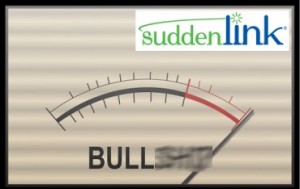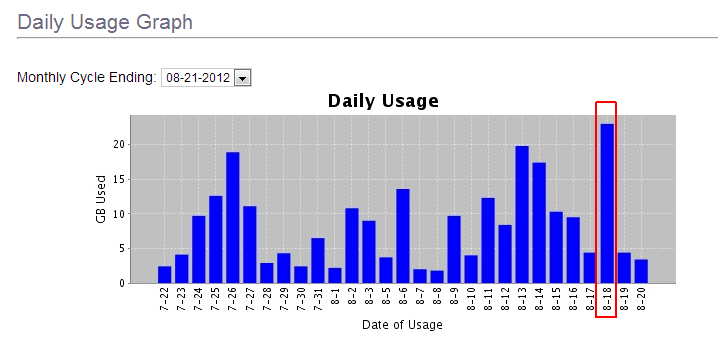
Phillip “The Company Paid by Suddenlink to Issue a Third Party Guarantee Makes All the Difference” Dampier
When Stop the Cap! and Broadband Reports reader Simon contacted us about Suddenlink’s fact-free usage measurement tool that managed to rack up nearly 23GB of usage for one West Virginia customer on the same day his service was out for most of the evening, he probably did not think one customer catching the cable company’s fingers in the usage cookie jar would make much difference.
But it did.
Suddenlink spokesman Pete Abel, initially responding to complaints about the usage tool’s accuracy, told Light Reading last week its meter was “consistently accurate, as was demonstrated in the tests we ran before we launched this program.”
Four days later, the company effectively disavowed that, put the meter’s built-in overlimit fee scheme on hold and plans to hire a third party company to “validate the accuracy of its system,” after finding it was faulty after all.
Suddenlink won’t say what is causing the inaccuracies, but blamed “unusual” circumstances for the problem. The company is now refunding customers billed overlimit fees of $10 per 50GB and waiving future charges until its system is reviewed and validated by “a trusted third party.”
Stop the Cap! believes that does not come close to satisfying the company’s responsibility to its customers for accurate billing.
Suddenlink has never demonstrated it actually needs an Internet Overcharging scheme with usage limits and overlimit fees. The company proves that when it claims only a “relatively small number of customers” were ever billed overlimit fees. With no demonstrable usage problem, the company’s need to implement its Project Imagine “Allowance Plan” is sorely lacking.
Additionally, the accuracy of providers’ usage measurement tools has proven highly suspect, and not just with Suddenlink. All of the companies caught with inaccurate meters always strongly defend them, until overwhelming evidence suggests they should not. Even super-sized companies like Bell Canada (BCE) and AT&T have enforced usage limits with meters the companies later had to disavow. Suddenlink is only the latest.
The scale in your grocery store is checked and certified. So is the corner gas pump, your electric meter, water meter, and gas meter. Why should broadband usage be any different?
Consumers are right to suspect Suddenlink’s usage meter. No official regulatory body verifies the accuracy of usage measurement tools and whatever company Suddenlink chooses to “verify” its meter has a built in conflict of interest — it works for a company that depends on a certain result in its favor. Suddenlink clearly has no business in the usage measurement business when it insists on the accuracy of a meter it disavows just a few days later.
 With only murky details available to consumers about what caused the problem and why Suddenlink did not see it until a customer managed to catch them in the act, there is little confidence the company will actually solve a problem it never realized it had. There is also nothing to assure us — “third party guarantee” or not — it cannot happen all over again.
With only murky details available to consumers about what caused the problem and why Suddenlink did not see it until a customer managed to catch them in the act, there is little confidence the company will actually solve a problem it never realized it had. There is also nothing to assure us — “third party guarantee” or not — it cannot happen all over again.
Suddenlink customers need to reach out and tell Suddenlink its “Allowance Plan” is completely unacceptable. Tell the cable company you don’t want to worry about their unverifiable and proven-inaccurate metering program. Ask them why you should remain a customer when they spend time and money on a scheme that the company itself admits is not really needed — targeting just a small number of “heavy users.”
Suddenlink’s customer service team does not think much of customers who use their broadband service a lot, as this recent “Who’s On First” exchange illustrates:
Lisa (Suddenlink): “Well, you show heavy OVERUSAGE of the Internet, you drew 14GB of data yesterday.”
Customer: “Okay, let’s back up, explain to me how I drew 12GB of data when my power was off and I wasn’t home on June 30.”
Lisa: “I didn’t say anything about June 30.”
Customer: “If you have sooo much faith in your meter, explain to me how I drew 12GBs of data on June 30, while I didn’t have power, and wasn’t home.”
Lisa: “I didn’t say anything about June 30.”
Customer: “I’m asking, how did I draw 12GB of data without power to my house?”
If Suddenlink has a problem with a handful of users creating problems for other subscribers on its broadband network, it has always reserved the right to contact those customers directly and work out the problem one on one. That is a far better solution than inconveniencing all of their customers with endless rounds of “usage roulette,” where the big winner could find themselves with Bill Shock from overlimit fees, whether they actually deserve them or not.
[flv]http://www.phillipdampier.com/video/CNBC Internet v. Cable 8-20-10.flv[/flv]
CNBC interviewed Suddenlink CEO Jerry Kent in August 2010 on how his company intends to deal with “invasive online video,” threatening to erode cable-TV profits. Kent proved Suddenlink doesn’t really need any extra money from overlimit fees — the days of big spending on capacity are over, but the money is nice to have anyway. (8 minutes)


 Subscribe
Subscribe






